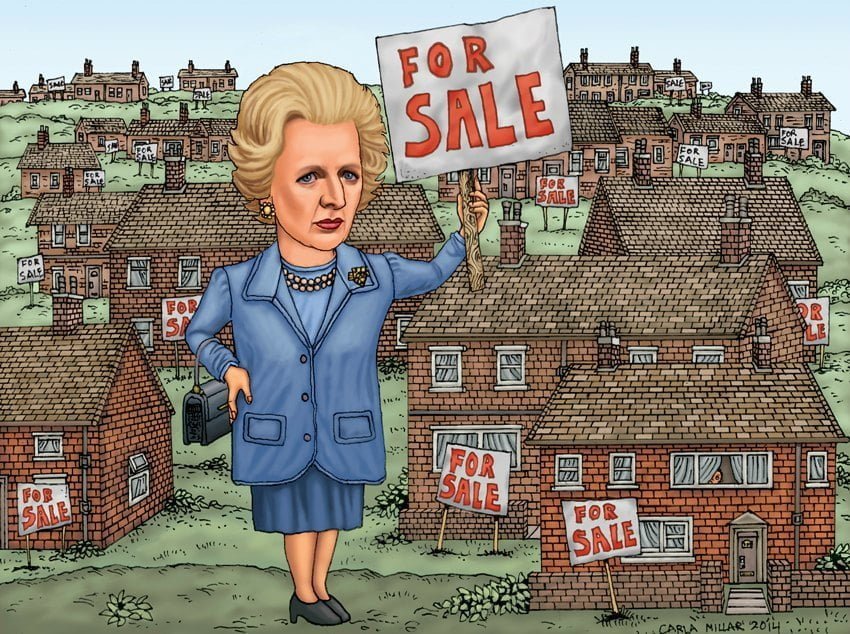The housing crisis in Britain is reaching staggering new extremes. The cost of renting is increasing faster than ever; evictions are on the rise; and all whilst one million homes sit empty across England alone.
In August, UK rents increased year-on-year by a staggering 12% on average. This is the largest annual increase on record.
Rents have increased fastest in cities. London saw a whopping 17% increase on top of already eye-watering rents. As a result, 52% of single renters now spend more than half of their incomes on rent.
Across the UK, newly-let properties now have an average monthly rent of £1,304, causing misery for those needing to move.
This all means increasing hardship for millions, whilst a tiny layer of landlords are laughing all the way to the bank.
Shortage
Decades after Thatcher’s ‘Right to Buy’, there is now a chronic shortage of affordable housing.
On average, house-share listings now receive 25 requests per room. To secure a place, many would-be tenants have to agree to a let as soon as they are listed, without even viewing the property. Slum-like conditions are therefore on the rise.
Housebuilding companies, meanwhile, are making massive profits: partly through focusing on luxury accommodation for the super-rich and speculators, and avoiding requirements for providing affordable housing; and partly by deliberately restricting supply.

In August, the Competition and Markets Authority found that large housebuilding companies “may be limiting competition or slowing build-out rates in some areas” to boost their profits.
This is of course what is happening. The whole raison d’etre of these companies is maximising profits, not building homes.
In addition to all this, the Bank of England has been hiking up interest rates, in order to try and bring down inflation. As a result, mortgage payments have sky-rocketed over the past year.
To maintain their profits, landlords are simply passing on these increased costs to their tenants; or even selling off properties they no longer deem profitable.
In the short term, this has led to a fall in average UK house prices over the last six months. But the picture is uneven across the country. And the long-term issue of a lack of affordable housing remains unresolved.
Evictions
A report from the Joseph Rowntree Foundation found that renters are twice as likely as homeowners to have anxiety. And for a good reason! Close to 40% of UK households are a single paycheck away from losing their homes.
Indeed, evictions are on the rise. Landlords have been forcing many tenants out of their homes as they become unable to afford rent due to low pay or job losses.

Furthermore, from Jan-March 2023, the number of ‘no-fault’ evictions increased by 41%. This trend is mainly driven by smaller landlords: it is more profitable for them to sell their properties than deal with higher mortgage costs.
As a result, there are currently more than 100,000 families in England languishing in ‘temporary accommodation’, often in appalling conditions – eclipsing the numbers recorded during the 2008 financial crisis. And homes sold off by smaller landlords are snapped up by large housing corporations, further concentrating wealth into fewer hands.
Reform?
Despite the runaway increases in rent, evictions, and homeless deaths, the Tories have no intention of dealing with the housing crisis.
Although the government’s long-delayed ‘Renters (Reform) Bill’, will nominally end ‘no-fault’ evictions, it will conveniently make it easier to repossess properties where tenants are ‘at fault’. Overall, it will do nothing to address the lack of affordable housing.
Indeed both the Tories and Starmer’s Labour have indicated their opposition to rent controls. But even if implemented, such ‘controls’ have their limits.
In Scotland, for example, a temporary rent cap means that landlords are only allowed to increase rents by a maximum of 3% on renewal. But, for new tenancies, rents have increased by 13%.
For landlords, it is therefore more profitable to offer shorter tenancy agreements, force occupants out by refusing to renew them, and then jack up the rent for new tenants. The result is even more instability for renters.
Revolution
This exemplifies the inability to make capitalism work in the interest of workers. The only solution to the housing crisis is through workers’ ownership and control of the economy.
Communists fight for the expropriation of the big landlords, letting agents, and property developers, so that we can put the 686,000 vacant and 257,000 ‘second homes’ across England to immediate use, at genuinely affordable rents.

Under democratic workers’ control and a socialist economic plan, the organised working class could bring about a transformation in housing and urban planning.
This would require taking the major banks and construction monopolies under public control, in order to finance retrofitting and improvements to existing Britain’s mouldy, leaky homes, whilst rapidly building millions more.
Only on this basis can we rid ourselves of landlordism, and all the miseries that capitalism creates.






